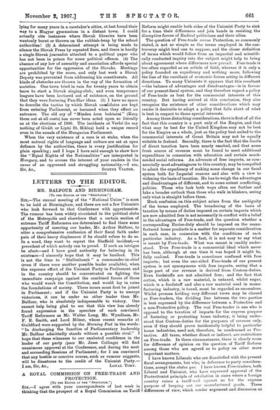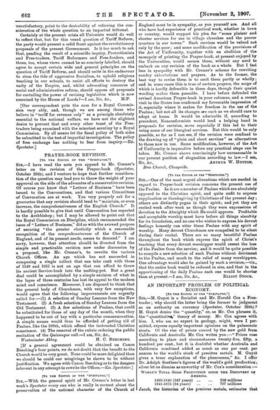A ROYAL COMMISSION ON FREE-TRADE AND PROTECTION. [To THE EDITOR
OF THE "SPECTATOR.") Sin,—I agree with your correspondents of last week in thinking that the prospect of a Royal Commission on Tariff
Reform might enable both sides of the Unionist Party to sink for a time their differences and join hands in resisting the disruptive forces of Radical politicians and their allies.
The question of Free-trade versus Protection, as commonly stated, is not so simple as the terms employed in the am- troversy might lead one to suppose, and the closer definition of terms which would follow from an impartial and scientifi- cally conducted inquiry into the subject might help to bring about agreement where differences now prevail. Free-trade is too often regarded as an article of faith, whereas it is only a policy founded on expediency and nothing more, following the line of the resultant of economic forces acting in different directions. To many Unionists it appears that this resultant —the balance of advantages and disadvantages—is in favour of our present fiscal system, and they therefore regard a policy of Free-trade as best for the commercial interests of this country. But having arrived at this conclusion, they also recognise the existence of other considerations which may render it desirable to adopt a policy that falls short of what is best in respect to those special interests.
Among these disturbing considerations, there is first of all the fact that this country is a part only of the Empire, and that what may be best for the United Kingdom may not be best for the Empire as a whole, just as the policy beat suited to the commercial interests of Great Britain may not be equally suitable to Ireland. Secondly, there is the fact that the limits of direct taxation have been nearly reached, and that some fresh source of revenue must be found to meet additional expenditure in connexion with education and certain much- needed social reforms. An advocate of free imports, as com- mercially most advantageous to this country, may be compelled to admit the expediency of making some change in our fiscal system both for Imperial reasons and also with a view to widening the basis of taxation. He has to weigh the advantages and disadvantages of different, and to some extent conflicting, policies. Those who look both ways often see further and take a broader outlook than those who walk in blinkers, seeing only what is straight before them.
Much confusion on this subject arises from the ambiguity of the terms employed. The broadening of the basis of taxation by means of duties imposed on certain imports which are now admitted free is not necessarily in conflict with a belief in the advantages of Free-trade, and the question whether a corresponding Excise-duty should be imposed on the manu- factured home products is a matter for separate consideration in each case, in connexion with the conditions of each particular industry. As a fact, it is not easy to say what is meant by Free-trade. What was meant is readily under- stood. True Free-trade is a commercial ideal which never has been, although at one time it was hoped it might be, fully realised. Free-trade is sometimes confused with free imports ; but even the one-sided Free-trade of our present system is not synonymous with free imports, seeing that a large part of our revenue is derived from Custom-duties. Even foodstuffs are not admitted free ; and the fact that cotton, which is a raw material, is untaxed, whilst sugar, which is a foodstuff and also a raw material used in manu- facturing industry, is taxed, must be regarded as anomalous. Whilst persons holding very different views may be classed as Free-traders, the dividing line between the two parties is best expressed by the difference between a Protective and a non-Protective policy. The real Free-trader is one who is opposed to the taxation of imports for the express purpose of fostering or protecting home industry, it being under- stood that Custom-duties for the purposes of revenue only, even if they should prove incidentally helpful to particular home industries, need not, therefore, be condemned as Pro- tective. All taxes, whether direct or indirect, are restrictions on Free-trade. In these circumstances, there is clearly room for difference of opinion on the question of Tariff Reform among those who are agreed as to policy on other more important matters.
I have known Liberals who are dissatisfied with the present fiscal arrangements, but who, in deference to party considera- tions, accept the status quo. I have known Free-traders, both Liberal and Unionist, who have expressed approval of the Protectionist principle of retaliation in cases where a foreign country raises a tariff-wall against us for the express purpose of keeping out our manufactured goods. These differences of view, which render argument and discussion so
unsatisfactory, point to the desirability of referring the con- sideration of the whole question to an impartial tribunal.
Certainly at the present crisis all Unionists would do well to reflect that, but for this vexed question of Tariff Reform, the party would present a solid front against the revolutionary proposals of the present Government. Is it too much to ask that, pending the result of a scientific inquiry, Protectionists and Free-traders, Tariff Reformers and Free-fooders, and those, too, whose views cannot be so concisely labelled, should agree to accept certain wide and general principles on the question of Tariff Reform, and should unite in the endeavour to stem the tide of aggressive Socialism, to uphold religious teaching in our schools, to resist all efforts to destroy the unity of the Empire, and, whilst advocating measures of social and administrative reform, should oppose all proposals for curtailing the power of revising legislation which is now
exercised by the House of Lords P—I am, Sir, &c., M.P.
[Our correspondent puts the case for a Royal Commis- sion very ably, and, though we are among those who believe in "tariff for revenue only" as a principle absolutely essential to the national welfare, we have not the slightest desire to prevent that and every other tenet of the Free- traders being examined with the minutest scrutiny by a Royal Commission. By all means let the fiscal policy of both sides be submitted to the test of impartial investigation. The policy of free exchange has nothing to fear from inquiry.—ED. Spectator.]































































 Previous page
Previous page